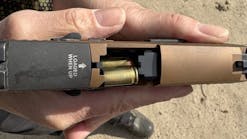Dealing with the Death of a Fellow Police Officer
Not long ago, I was on the phone with a police captain from a different state – almost on the other end of the country from my location in Maryland. We were talking about officers injured and killed while on traffic safety or traffic enforcement duties. I remember him making the comment that he didn’t know how I dealt with it: seeing every line of duty death from across the country, day in and day out.
The truth is, both tragically and not, I’m not the only one. There are whole organizations devoted to tracking line of duty deaths, sharing the information about them, cataloging them; heck, there’s an entire memorial in Washington, D.C., dedicated to officers who died in the line of duty – as well there should be. I imagine there are plenty of other officers, active and retired, who pay attention to every Line of Duty Death (LODD). I also imagine there are plenty who try to avoid seeing the news about them. Why?
Because everyone deals with death, loss and suffering in different ways. I know men who have been diagnosed with post-traumatic stress injuries (PTSI) attributed to the physical and emotional trauma they observed in the course of their duties. Some of those men are/were police officers while some are/were firefighters and paramedics. Those who face the challenge of PTSI shouldn’t have to be slapped in the face with another officer’s injury; another officer’s death; another loss in what may seem like a loosely knit family but is, in reality, held together by ties stronger than many biological families ever experience.
In response to that captain’s comment, I pointed out that I honor the fallen by trying to learn any lessons that might be available from the situation wherein they made the ultimate sacrifice. Was there simply no avoiding it? Would a difference in awareness possibly have made a difference in the outcome? Was there a tactical error made that could be corrected through training or a change in policy? I try to learn from the deaths of those officers because it’s my way of honoring them. You see, I truly believe that they wouldn’t want any other officer to die the same way if it can be avoided. I truly believe that they would want us to learn anything we can to help reduce LODDs.
If you have trouble dealing with the feelings you experience when you see news about another officer’s death in the line of duty, don’t face the challenge alone. Reach out to a brother or sister officer who you trust and talk to them. Reach out to your minister, priest or other spiritual advisor and talk to them. Reach out to the police mental health professionals and talk to them. Unmanaged grief and stress is like an ugly pimple: it grows and festers and becomes increasingly more uncomfortable until it has to be dealt with… or it explodes.
There are a plethora of organizations that now offer coaching, mentoring, counseling and other services to assist you with stress and grief management. Most of them are free, and those that charge are usually billing the agency and not the officer. Most of those services will keep your information completely confidential, but be aware: if the agency is paying for the service, there is always the chance that the agency will get a report back.
Also keep this in mind: If you are seeking assistance, or know you need it, and you’re afraid that the agency will suspend you, put you on admin duty, etc., that already says something about your own opinion of your fitness to work the street. Understand this too: none of us… NONE of us, is always 100%, 100% of the time. ALL of us have those moments when something going on in our lives distracts us from the necessary focus we need to survive the streets, perform professionally and go home safely at the end of our shift. In today’s world, “go home safely,” doesn’t just mean without physical injury. It also means without emotional, mental or spiritual injury and without having done something on duty that might affect our future family or financial stability.
Yes, that’s a lot to juggle. It may seem new, but we’ve always juggled these things. What we didn’t use to have to deal with was the invasiveness of everyone else looking into our lives and days. We didn’t use to have to deal with every amateur “journalist” with a cell phone camera. We didn’t use to have to deal with “progressive” prosecutors and activist judges.
Now, more than ever, we need to stand together and be there for each other. Just remember: your brothers and sisters in blue can’t be there for you if they don’t know what’s needed of them. Don’t be afraid of being judged for being human. Be honest with yourself and those you talk to. Don’t let the job put you in an early grave, and definitely don’t let it put you in the mindset that an early grave is preferable.
Stay alert. Stay alive. Stay safe.

Lt. Frank Borelli (ret), Editorial Director | Editorial Director
Lt. Frank Borelli is the Editorial Director for the Officer Media Group. Frank brings 20+ years of writing and editing experience in addition to 40 years of law enforcement operations, administration and training experience to the team.
Frank has had numerous books published which are available on Amazon.com, BarnesAndNoble.com, and other major retail outlets.
If you have any comments or questions, you can contact him via email at [email protected].



